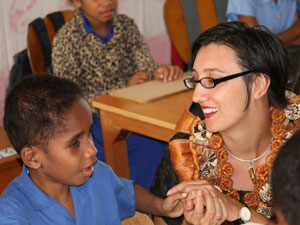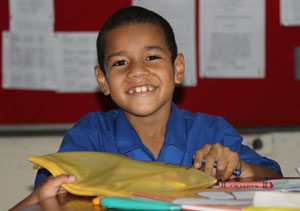All children have the right to a quality education to develop their skills, build their confidence, and set them up for a positive future.
While many developing countries are making significant progress towards achieving universal primary school attendance, children with disabilities are increasingly being left behind. Mainstream schools are often not equipped to manage the development of a child with special needs, leading to marginalisation, exclusion, and even discrimination.
To help some of the poorest and most vulnerable children in Fiji stay in school, Australia is supporting a number of special needs institutions to improve their quality of education services, renovate their facilities, and ease their financial burdens.
'The Access to Quality Education Program highlights the Australian Government's strong and on-going commitment to support Fiji's education sector', said Ms Judith Robinson, Acting Australian High Commissioner. 'The new program will increase access to education by reducing financial barriers. It will also improve infrastructure and facilities in the most disadvantaged schools to ensure learning environments are adequate and safe and contribute to improved learning outcomes,'
Launched in Fiji in October 2011, the five-year program will invest $30 million to improve education services for children with disabilities and those from poor, remote areas, building on Australia's continued work in Fiji's education sector.
During the development of the Access to Quality Education Program, Australia helped the Hilton Special School and the Fiji Society for the Blind provide better access to education for children. This included improving their facilities and funding additional special needs teaching supplies. The support also included funds for a new school bus for Hilton Special School, replacing the previous twenty-year-old vehicle.
'In the past, because we had a bus that was constantly breaking down, the children would miss coming to school for one week, even two weeks,' said Merelesita Qeleni, the Principal of Hilton Special High School. 'But now with the new school bus they're able to come to school every day, which is very good.'
Australian funding of $400,000 (2009-2011) also meant Hilton Special School could improve education services and life-skills training for its 84 students with hearing impairments and physical disabilities. The finances were used to cyclone-proof buildings, renovate classrooms, improve the safety of the playground, and build a cover over the multi-purpose outdoor area so children can gather for school-wide activities, regardless of weather. This has also benefitted 60 students with special needs in the early intervention centre, and 40 students from rural areas who stay in the school's hostel during the week.
Australian funding to the Fiji Society for the Blind supported the continued operation of the school hostel, and a community outreach program to 15 villages benefitting up to 400 individuals. Australia also supplied special equipment to the school, such as braille machines and paper, helping 59 visually impaired children to complete their education and increase their employment prospects.
Around 30 per cent of Australia's annual aid allocation to Fiji is spent on education, with a significant focus on increasing opportunities for children with disabilities.
More information
Australia's aid program in Fiji



